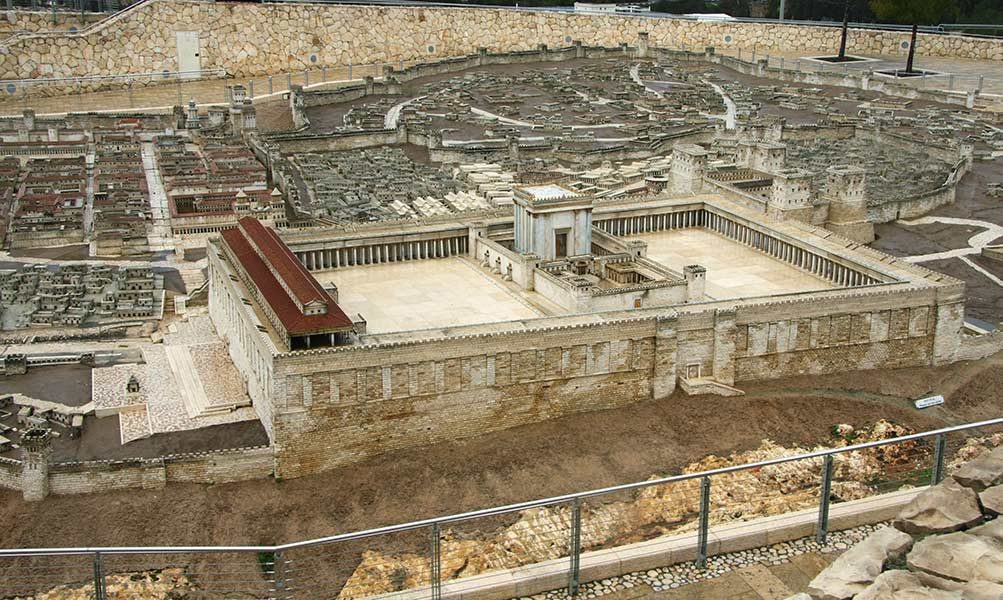The Path to Peace?
 By Russell Haitch
By Russell Haitch
When David prays, “Create in me a clean heart,” he is not asking God for an angioplasty. The focus of creation here is not physical molecules. This point seems obvious, but its implications for rediscovering Genesis are immense.
Likewise, when Isaiah uses the same verb (bara’) to speak of God creating Israel (Isa. 43:1) and creating Jerusalem (65:18), the goal in view is not a physical building project. Rather, God’s creative work involves redeeming and restoring people.
Now what if something similar is true of creation in Genesis? In other words, what if God is not configuring physical molecules, but instead ordering the cosmos and turning the whole world into a temple of worship?

The following interpretation draws heavily on the scholarship of John Walton and others who have studied the ancient Near East, in order to figure out what the Hebrew words of the Bible meant to the people who first heard them. However, the basic insights of this reading can be gleaned simply by using Scripture to illuminate Scripture.
In this new (or rather, ancient) reading of Genesis, the conflict with evolution starts immediately to evaporate. Evolution becomes simply a scientific theory, to be evaluated on its scientific merits. But Genesis and evolution are no longer at odds, if we come to accept that Genesis is not an account of physical molecules or physical origins.
This reading of Genesis is not a new one forced upon us by scientific evidence. It is an old reading based on Biblical evidence. It is not a reading that says Genesis must be interpreted as mythical or figurative. Instead, it says God literally created everything in the span of just seven days—but first we need to understand what creation literally means, in the Bible.
“
In the Bible, creating is done by God alone. The verb bara’ applies only to Yahweh or Elohim.
”
Because we live in a scientific age, it is easy and almost automatic to think creation means bringing physical molecules into existence. The physical realm feels most real to us. Churches and corporation alike will talk about their DNA, thus applying physical language even to things that are clearly not that.
But molecules, DNA or otherwise, are not the focus of Genesis. To be sure, God cares about the physical realm and many verses (John 1:3, Col. 1:16, Heb. 11:3, 2 Cor. 4:6, Rom. 4:17) suggest God made the visible world and did so ex nihilo—out of nothing. But what if this is not the story Genesis is telling? After all, when God starts to create in Genesis, there is already a physical earth with physical water (Gen. 1:2). This fact is often overlooked, but it should prompt us to think more deeply about what it means for God to create and for people to be created.
What does it mean for God to create?
In the Bible, creating is done by God alone. The verb bara’ applies only to Yahweh or Elohim, all fifty times it is used in the Old Testament. People can make all sorts of stuff, but only God creates; only God is said to bara’. Perhaps the reason why is because creating entails ordering people and things into right relationship with God.

One way that God creates people and things is by speaking and calling to them, thus ordaining, appointing, and anointing them for a purpose. Overall, the first twelve chapters of Genesis tell us a lot about God’s call. We hear God calling Abraham and Sarah from among the scattered peoples. God calling Noah and Naamah (his wife, according to midrash) from among the disobedient populace. God calling Adam and Eve out of the dust of mortality. God calling light out of darkness.
In sum, what if creating in Genesis is not material creation, but purposeful, relational creation?
The difference between material creation and relational creation can be seen by analogy. Think of the difference between a house and a home. A house has physical material, but a home has personal inhabitants. If I were telling you about our house, I might point out that the walls are painted in an off-white semi-gloss (a.k.a. Sherwin Williams SW 7008 Alabaster). But now, imagine you are stepping in our home. The markings on this wall here show our childrens’ heights, and this pencil scratch is the year our little son Andrew grew about a foot. We are looking at the same physical walls, yet the focus shifts.
What if Genesis 1 is describing the week that God converts the universe from a house into a home; the week God chooses to move into the cosmos in a personal way? This idea may feel alien to us, because our minds tend to think in terms of a physical universe, rather than thinking first of God’s indwelling presence. This idea was easier for the first listeners of Genesis to grasp, in part because the Hebrew words and phrases contain allusions and echoes of accounts in their surrounding culture, and specifically to narratives where temples were being made for their gods. Genesis is saying: when our God decide to create a temple, the whole world became his dwelling place.
“
What if creating in Genesis is not material creation, but purposeful, relational creation?
”
Put another way, God’s job description in Genesis is not house-builder, but homemaker. That’s because create (bara’) means to order or arrange; to imbue with meaning and purpose; to set people or things into right relationship with God.
What, then, does it mean for people to be created by God?
Again, in a scientific age it is easy and almost automatic to think that being created—having existence and life—means having a beating heart and electric brain. But we know from other passages of Scripture this is not true. A person can have biological existence and still be dead in trespasses and sins. A person can be lying in the grave and still be alive in Christ. Creation, life and death all have spiritual as well as physical meanings in the Bible.
To understand what it means for people to be created by God, we need to enter into the Bible and think as Bible people do about these things. To be created (to have what we would call existence) means you have a name that has been given to you and is your name. A people who are your people and to whom you belong. A land that is your land, on which you toil. Above all, a God who is your God, to whom you call upon, for whoever calls upon the name of the Lord shall be saved.
It is no coincidence, therefore, that God creates and names almost in the same breath. God called the light Day. God called the darkness Night. God called the dome Sky. Adam, would you like to try exercising some of this Godlike, creative power? Here are some animals. What names will you call them? Parents, you too can have Godlike power. Here are your children. What names, formal or informal, will you call them? Spouses, same thing. Names have power. They create reality. Don’t misuse names—especially the name of the Lord.
Names are an important part of being created, but names are not everything. It is also no coincidence that the second chapter of Genesis goes into more depth about humanity’s creation by explaining that God puts people in a Garden to till and keep it. How can you be created and truly exist unless you have life-sustaining and dignifying work to do? Also no coincidence that the first “no good” in the Bible is for Adam to be alone. How can you be created or truly exist unless you have another person who knows you, who is part of you, and to whom you cling?
It could be that material existence, which feels most real to most of us, is actually not the focus of Genesis 1-2. In this new reading, which may really be the old reading of people who first heard the Word, Genesis is not as an explanation of chemical or biological origins, but rather an account of God creating real life that is simultaneously physical, spiritual, and relational.
When God begins to create in Genesis 1, there is already, as noted, a physical “earth,” but what kind of earth would you call it? Just a formless void, until God speaks, imparting order, purpose, and relationality. When God’s Spirit moves upon the chaotic face of the deep, then transformation can happen astoundingly quickly. Suddenly, things have names. The dry ground is called land, and the land has people to work it, and people have each other to lie down beside at the end of the day. This is reality we can inhabit. More important, it is reality God has chosen to inhabit.
In this reading, Adam and Eve are not the first people. But they are the first to be called God’s people—the first to be made truly alive. Not just Adam, but all people are “formed from dust” (Psalm 103:14), because dust is the condition of mortality. In relation to God, Adam and Eve can eat from the tree of life. In separation from God, they return to the dust. In relation to Christ, they and we are again able to taste the tree of immortality.

“
When the Ark of God’s presence enters the temple, the physical space is transformed entirely.
”
Finally, if we believe that Genesis is not an account of biological or chemical origins, but rather of relational creation, this belief in no way denigrates the physical realm. Far from it. The physical realm gains value in relation to God’s Spirit. Recall the building of the temple at the time of Solomon. Great care is taken in choosing the materials. The building process is long, the labor arduous. At last, the physical project is done. But it is still just a house, not yet God’s home.
When the Ark of God’s presence enters the temple, the physical space is transformed entirely in relation to God’s Spirit. The weight of glory is so great the priests are unable to stand to minister. The building took many years. But the dedication, in which God’s Spirit actually takes up residence within the temple, is short and powerful. It happens in the span of just seven days.
And the people would think: Where have we heard this story before?
Russell Haitch is Professor of Theology and Human Science
at Bethany Theological Seminary.

